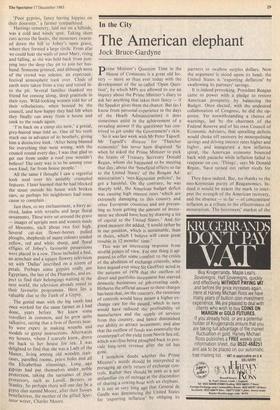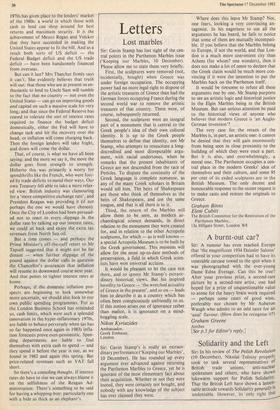In the City
The American elephant
Jock Bruce-Gardyne
Prime Minister's Question Time in the House of Commons is a great old lot- tery — more so than ever today with the
development of the so-called 'Open Ques- tion', by which MPs are allowed to use an inquiry about the Prime Minister's diary to ask her anything that takes their fancy — if the Speaker gives them the chance. But (as I know from personal experience in the days of the Heath Administration) it does sometimes assist in the achievement of a revealing answer if the questioner has con- trived to get under the Government's skin.
So it was last week with Mr Peter Tapsell. Mr Tapsell's distaste for 'Thatcher economics' has never been disguised. So when he asked the Prime Minister to pick the brains of Treasury Secretary Donald Regan, whom she happened to be meeting that day, about the 'beneficial effects so far to the United States' of the Reagan Ad- ministration's 'neo-Keynesian policies', he got a basinful. On the contrary, he was sharply told, the American budget deficit was causing high interest rates 'which are extremely damaging to this country and other European countries and are preven- ting us from getting the amount of invest- ment we should have here by drawing a lot of capital to the United States.' And for good measure she added, 'I would rather be in our position, which is sustainable, than in theirs, which I believe will cause great trouble in 12 months' time.'
This was an interesting response from several points of view. For one thing it ap- peared to offer some comfort to the critics of the abolition of exchange controls, who have argued ever since Sir Geoffrey acted in the autumn of 1979 that the outflow of direct and portfolio investment has starved domestic businesses of job-creating cash. Hitherto the official answer to these charges has been that, on the contrary, the retention of controls would have meant a higher ex- change rate for the pound, which in turn would have reduced the profitability of manufacture and the supply of services from this country, and hence diminished our ability to attract investment; and also that the outflow of funds was essentially the counterpart of the yield from North Sea oil, which was thus being ploughed back to pro- vide long-term revenue after the oil has gone. I somehow doubt whether the Prime Minister's words should be interpreted as presaging an early return of exchange con- trols. Rather they should be seen as a not unfamiliar cry of outrage at the discomfort of sharing a rowing-boat with an elephant. It is not so very long ago that General de Gaulle was denouncing the United States for 'exporting inflation' by obliging its partners to swallow surplus dollars. Now the argument is stood upon its head: the United States is 'exporting deflation' by swallowing its partners' savings.
It is indeed provoking. President Reagan came to power with a pledge to restore American prosperity by balancing the Budget. Once elected, with the undesired collaboration of Congress, he did the op- posite. Yet notwithstanding a chorus of warnings, led by the chairmen of the Federal Reserve and of his own Council of Economic Advisers, that spiralling deficits would choke off recovery by monopolising savings and driving interest rates higher and higher, and inaugurate a new inflation spiral, the American economy bounced back with panache while inflation failed to reappear on cue. 'Things', says Mr Donald Regan, 'have turned out rather nicely for us'.
They have indeed. But, no thanks to the neo-Keynesian purity of Reaganomics. In- deed it would be nearer the mark to inter- pret the strength of the American recovery, and the absence — so far — of concomitant inflation as a tribute to the effectiveness of monetarism. The borrowers' market of the 1970s has given place to the lenders' market of the 1980s: a world in which those with cash to lend can shop around for best returns and maximum security. It is the achievement of Messrs Regan and Volcker that they have succeeded in making the
United States appear to fit the bill. And as a result both sorts of US deficit — the
Federal Budget deficit and the US trade deficit — have been handsomely financed from overseas.
But can it last? Mrs Thatcher firmly says it can't. She evidently believes that truth will out: that those who are at present so en-
thusiastic to lend to Uncle Sam will tumble to the fact that no country — not even the United States — can go on importing goods
and capital on such a massive scale for very long; and that since the Federal Reserve has ceased to tolerate the sort of interest rates required to finance the budget deficit domestically, either the Fed will have to change tack and hit the recovery over the head, or inflation will come charging back. Then the foreign lenders will take fright, and down will come the dollar.
That, of course, is what we have all been saying: and the more we say it, the more the dollar goes from strength to strength.
Hitherto this was primarily a worry for spendthrifts like the French, who were forc- ed by trade deficits to mend their ways. Our own Treasury felt able to take a more relax- ed view: British industry was clamouring for a 'more competitive exchange rate', and President Reagan was providing it (if not perhaps the one we would have chosen).
Once the City of London had been persuad- ed not to react to every slippage in the dollar rate by talking up our interest rates, we could sit back and enjoy the extra tax revenues from North Sea oil, But a time comes — and perhaps the Prime Minister's off-the-cuff retort to Mr Tapsell suggested that it might not be far distant — when further slippage of the pound against the dollar calls in question the Chancellor's assurances that inflation will resume its downward course next year. And that points to tighter interest rates at home.
Perhaps, if the domestic inflation pro- spects are beginning to look somewhat more uncertain, we should also look to our own public spending programmes. For as the London Business School has reminded us, cash limits, which were such a splendid innovation in the hyper-inflationary 1970s, are liable to behave perversely when (as has so far happened once again in 1983) infla- tion forecasts prove over-pessimistic. Spen- ding departments are liable to find themselves with extra cash to spend — and they spend it before the year is out, as we found in 1982 and again this spring. But price-related revenues such as VAT fall short.
So there's a consoling thought. If interest rates do have to rise we can always blame it on the selfishness of the Reagan Ad- ministration. There's something to be said for having a whipping-boy: particularly one with a hide as thick as an elephant's.







































































 Previous page
Previous page